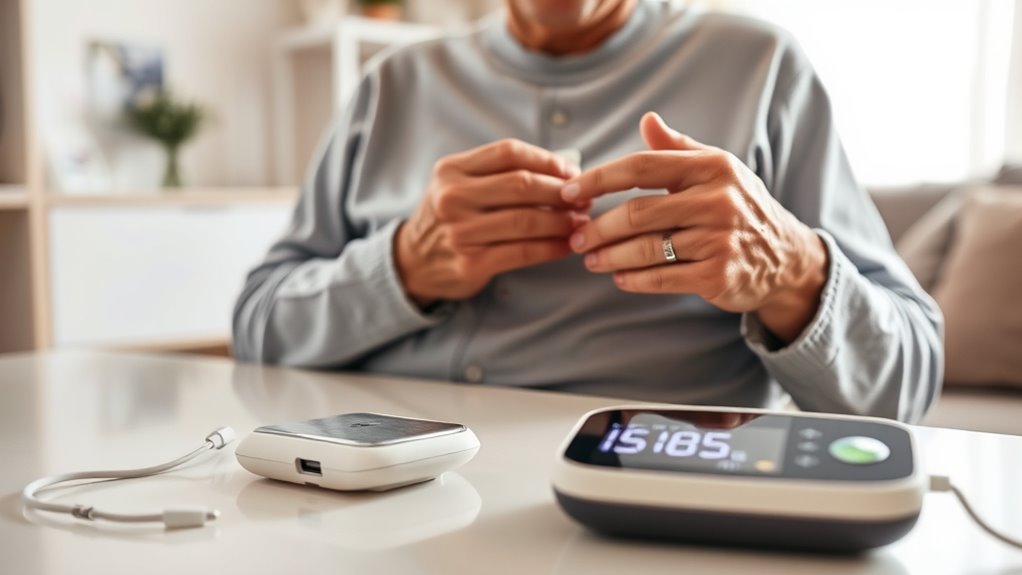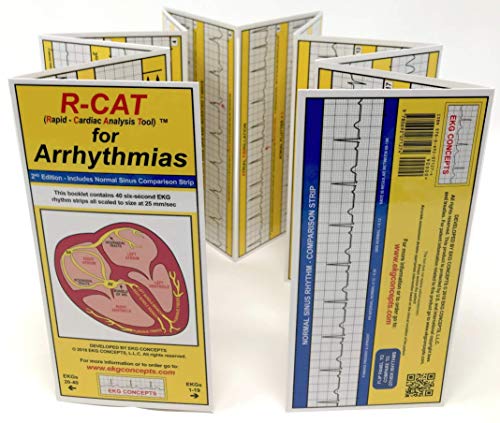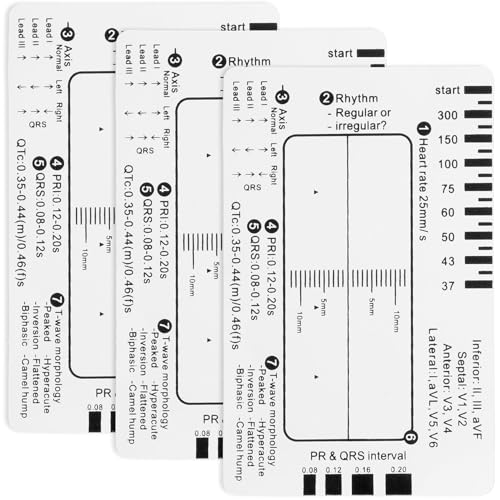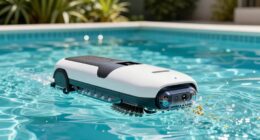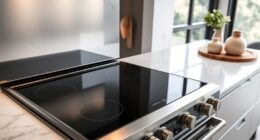If you’re exploring the best at-home EKG devices for seniors, I’ve found options that combine accuracy, ease of use, and portability. Devices like KardiaMobile and Beurer Cardio Companion offer quick, reliable readings with simple interfaces, perfect for older users. Accessories like calipers and interpretation cards further enhance understanding. Keep in mind the importance of compatibility, data security, and medical validation. Stay with me to uncover detailed features that make these tools ideal for safe, independent heart monitoring.
Key Takeaways
- Portable, user-friendly EKG devices with large displays and simple operation ideal for seniors’ at-home heart monitoring.
- Medical-grade devices like KardiaMobile offer accurate arrhythmia detection compatible with smartphones and secure data sharing.
- Devices feature quick measurements, wireless connectivity, and apps for easy tracking, management, and remote healthcare communication.
- Rugged, waterproof options with accessories enhance durability, safety, and convenience for everyday use and travel.
- Support tools like interpretation cards and portable analysis devices assist seniors and caregivers in understanding heart rhythms accurately.
Beurer Cardio Companion EKG Monitor
If you’re looking for a reliable, easy-to-use EKG device for home monitoring, the Beurer Cardio Companion EKG Monitor ME75 is a great choice—especially for seniors who want quick, accurate results without complex setups. This German-engineered, portable device features a bright color display for clear readings and offers four measurement options: hand-to-hand, finger-to-chest, finger-to-finger, and finger-to-leg. It captures real-time heart data in under 30 seconds and detects irregular rhythms. You can store up to 100 readings or sync unlimited measurements via Bluetooth to the free app. Its rechargeable battery guarantees convenience, making it ideal for private, at-home heart health monitoring.
Best For: seniors and home users seeking a reliable, easy-to-use portable ECG device for quick heart monitoring without complex setup.
Pros:
- Portable, lightweight design with a bright color display for easy readings
- Multiple measurement options (hand-to-hand, finger-to-chest, finger-to-finger, finger-to-leg) for versatile use
- Stores up to 100 readings and syncs unlimited data via Bluetooth for comprehensive tracking
Cons:
- Not suitable for individuals with pacemakers, metal implants, or electrical devices in the body
- Requires regular charging due to rechargeable battery
- Limited to home use; not designed for professional or clinical settings
KardiaMobile 1-Lead EKG Monitor for Smartphones
The KardiaMobile 1-Lead EKG Monitor is an ideal choice for seniors who want a portable, medical-grade device that quickly provides accurate heart rhythm readings. In just 30 seconds, it records EKGs that can be instantly analyzed on your smartphone. Its compact design fits easily in your pocket, making it perfect for on-the-go use. Simply place your fingers on the sensors to detect conditions like Atrial Fibrillation, Bradycardia, Tachycardia, or Normal Sinus Rhythm—no subscription needed for these core features. Compatible with most smartphones and tablets, it’s a reliable, FDA-cleared device trusted by millions for easy, accurate heart monitoring at home.
Best For: seniors seeking a portable, easy-to-use, medical-grade device for quick and reliable heart rhythm monitoring at home or on-the-go.
Pros:
- Compact, pocket-sized design for portability and convenience
- Provides quick, 30-second medical-grade EKG recordings with instant analysis
- No subscription required for core features like detecting AFib, Bradycardia, Tachycardia, and Normal Sinus Rhythm
Cons:
- Not suitable for use with pacemakers or implantable cardioverter defibrillators (ICDs)
- Does not detect heart attacks or other acute cardiac events
- Additional features and management options require a KardiaCare subscription
KardiaMobile 1-Lead Personal EKG Monitor
For seniors seeking an easy, reliable way to monitor their heart health at home, the KardiaMobile 1-Lead Personal EKG Monitor stands out as an excellent choice. It records medical-grade EKGs directly on your smartphone in just 30 seconds, detecting irregularities like AFib, bradycardia, and tachycardia. The device is compact, lightweight, and simple to use—just place your fingers on the sensors. It works with most smartphones and tablets via the Kardia app, which offers tutorials and support. Trusted by millions, it provides instant analysis and the option to email or save EKGs for your doctor, all without a subscription.
Best For: seniors and individuals seeking an easy, reliable way to monitor their heart health at home with quick, medical-grade EKG recordings.
Pros:
- Compact, lightweight, and portable design for easy everyday use
- Provides instant, medical-grade EKG analysis without a subscription
- Compatible with most smartphones and tablets, with user-friendly app support
Cons:
- Does not check for heart attacks or work with pacemakers and ICDs
- Optional KardiaCare subscription required for advanced features and detections
- Limited to 1-lead EKGs, which may not be as comprehensive as multi-lead devices
EverOne EVOPM10 Portable Bluetooth ECG Monitor with App
Designed with ease of use in mind, the EverOne EVOPM10 Portable Bluetooth ECG Monitor is ideal for seniors who want quick, accurate heart monitoring without complicated setup. Its compact, wire-free design makes it simple to handle, measuring just 3.9 x 1.8 x 0.6 inches and weighing only 2.08 ounces. Compatible with iOS, Android, and Windows devices, it connects effortlessly via Bluetooth. You can quickly get results in 10 to 30 seconds by placing the sensor on your chest, palms, wrist, or ankle. The device also features a bright color display and a rechargeable battery that supports up to 500 measurements, making heart monitoring convenient and reliable.
Best For: seniors and individuals seeking a simple, portable, and wireless way to monitor their heart health quickly and accurately.
Pros:
- Compact and lightweight design for easy handling and portability
- Wireless Bluetooth connectivity with smartphone and PC compatibility for convenient data sharing
- Quick measurement process with results in just 10 to 30 seconds
Cons:
- Requires a compatible smartphone or PC with supporting software or apps for data viewing and sharing
- Limited to 500 measurements per full battery charge, which may be insufficient for frequent monitoring needs
- The small display might be less ideal for users with visual impairments needing larger screens
AliveCor KardiaMobile Card Personal EKG Device
If you’re looking for a compact, easy-to-use EKG device that fits seamlessly into your daily routine, the AliveCor KardiaMobile Card is an excellent choice. This wallet-sized, lightweight device delivers medical-grade EKG recordings and detects arrhythmias like Atrial Fibrillation, Bradycardia, and Tachycardia within seconds. It connects wirelessly via Bluetooth to your smartphone or tablet, requiring no WiFi. Simple to operate—just place your fingers on the sensors—it’s perfect for seniors seeking quick, accurate heart monitoring. FDA-cleared and doctor-recommended, the KardiaMobile Card provides reliable results without a subscription for core features, making heart health accessible anywhere.
Best For: seniors and on-the-go individuals seeking a compact, easy-to-use device for quick, accurate heart rhythm monitoring without the need for a subscription.
Pros:
- Compact, wallet-sized design easily fits into a wallet or pocket for portability
- Medical-grade EKG recordings with quick detection of arrhythmias such as AFib, Bradycardia, and Tachycardia
- No subscription required for core detection features, providing reliable and accessible heart monitoring
Cons:
- Additional detection features require a KardiaCare subscription, which is not included with the device
- Compatibility may vary; users should check alivecor.com/compatibility for their devices
- Does not include WiFi connectivity, relying solely on Bluetooth for device pairing
Case for KardiaMobile 1L/6L Personal EKG Monitor
The case for the KardiaMobile 1L/6L Personal EKG Monitor stands out as an essential accessory for anyone who values protection and portability. Its shockproof, dustproof, and waterproof design keeps the device safe from drops, scratches, and splashes, whether at home or on the go. It features a compact, lightweight EVA shell that fits easily into bags or pockets. Plus, the included moisture-proof pill box with two compartments makes it simple to carry medication. The durable carabiner clip allows for quick attachment to backpacks or totes, making it perfect for travel, daily use, or busy lifestyles. It’s a practical, organized solution for heart health monitoring.
Best For: individuals who need reliable device protection and convenient medication storage for travel, daily health monitoring, or busy lifestyles.
Pros:
- Shockproof, dustproof, and waterproof design offers comprehensive protection for the device
- Compact and lightweight, easily fits into bags or pockets for portability
- Includes a moisture-proof pill box and durable carabiner clip for added convenience
Cons:
- KardiaMobile device and accessories are not included, requiring separate purchase
- Limited storage capacity strictly for medication and small accessories, not larger items
- May not fit all KardiaMobile models if dimensions vary slightly
EKG Rhythm Interpretation Badge Card – Pocket-Sized ECG/EKG Cheat Sheet
This pocket-sized EKG rhythm interpretation badge card is an essential tool for healthcare professionals who need quick, accurate guidance in high-pressure situations. It’s a compact, durable reference with all-in-one EKG/ECG rhythm info on a lightweight, waterproof badge. Its double-sided design fits easily on horizontal or vertical badge reels or lanyards, making it highly portable. The card covers basic to advanced rhythms, including STEMI, NSTEMI, and arrhythmias, enabling rapid interpretation. Perfect for nurses, paramedics, and students, it simplifies complex rhythms and supports fast decision-making. Its sturdy build guarantees it withstands daily clinical use, making it an invaluable pocket companion.
Best For: healthcare professionals such as nurses, paramedics, medical students, and doctors who require quick, accurate ECG/EKG rhythm reference in clinical and emergency settings.
Pros:
- Compact, lightweight, and waterproof design for durability and portability
- Double-sided layout compatible with various badge reel or lanyard styles
- Covers a wide range of basic to advanced ECG rhythms, aiding rapid interpretation
Cons:
- May be too small for users preferring larger, more detailed reference materials
- Limited space might restrict extensive information or detailed explanations
- Requires familiarity with ECG terminology to maximize its usefulness
R-CAT EKG Window 2nd Edition
For healthcare professionals seeking a precise and portable EKG analysis tool, the R-CAT EKG Window 2nd Edition stands out. Its compact design, measuring just 3.25 x 6.75 inches, makes it easy to carry and use anywhere. The reversible see-through baseline window allows quick identification of ST segment changes on EKG strips. It features calibrated red boxes for accurate measurement of intervals like PR, QRS, QT, and Q-Waves, helping to diagnose conduction issues. Suitable for both rhythm strips and 12-lead EKGs, this versatile device improves diagnostic accuracy. Plus, its included examples enhance interpretation skills, making it an invaluable addition to any cardiac assessment toolkit.
Best For: healthcare professionals who need a portable, accurate, and easy-to-use EKG analysis tool for clinical and educational purposes.
Pros:
- Compact and lightweight design for easy portability
- Reversible see-through baseline window for quick ST segment identification
- Calibrated measurement boxes for precise interval analysis across various EKG formats
Cons:
- Limited to surface EKG analysis; not suitable for advanced digital interpretation
- May require familiarity with EKG measurement techniques for optimal use
- Cannot replace comprehensive digital EKG systems for detailed diagnostics
EKG Rhythm Interpretation Card with Magnifier & Badge Holder
If you need a reliable tool to help quickly interpret EKG rhythms, the EKG Rhythm Interpretation Card with Magnifier & Badge Holder is an excellent choice for healthcare professionals, nurses, and caregivers working with seniors. This durable plastic card features large, upgraded text and dual-sided printing for easy access to all essential rhythms, including STEMI, NSTEMI, and arrhythmias. The included 3X magnifier, made of flexible PVC, makes reading small details simpler, especially for those with presbyopia. Its waterproof badge holder is ready for bedside or emergency use, fitting comfortably on a uniform or lanyard. It’s a practical, compact tool for accurate, quick heart monitoring.
Best For: healthcare professionals, nurses, and caregivers working with seniors who need quick, reliable EKG rhythm interpretation tools.
Pros:
- Durable plastic construction with large, easy-to-read upgraded text for quick reference
- Includes a 3X flexible PVC magnifier to assist with reading small details, ideal for presbyopia
- Waterproof badge holder with resealable zipper, suitable for bedside or emergency use
Cons:
- Small text size may still be challenging for individuals with severe presbyopia or visual impairments
- Magnifier and badge holder are separate accessories that require handling and proper placement
- Compatibility is limited to specific monitor types like KardiaMobile and EMAY, which may not suit all devices
R-CAT EKG Pocket Reference Guide
The R-CAT EKG Pocket Reference Guide stands out as an essential tool for healthcare professionals and students who need quick, accurate rhythm analysis. It covers every known six-second EKG rhythm strip, calibrated to standard print sizes, making it a reliable reference during clinical practice or study. With a normal sinus comparison strip, it simplifies rhythm differentiation. The guide features precise measurements for heart rate, PR interval, QRS duration, and QT interval, helping users interpret complex arrhythmias confidently. Its durable, foldable design allows for easy portability and reusability, making it an invaluable resource for quick decisions and ongoing education in heart monitoring.
Best For: Healthcare professionals, students, and emergency responders seeking a quick, accurate, and durable reference for EKG rhythm analysis and measurement.
Pros:
- Comprehensive coverage of all known six-second EKG rhythms with calibration for precise measurement
- Durable, foldable, laminated design suitable for busy clinical environments
- Enhances learning and confidence in interpreting complex cardiac arrhythmias
Cons:
- May be overwhelming for beginners without prior EKG knowledge
- Limited to six-second rhythm strips; does not include longer or continuous monitoring data
- Requires familiarity with EKG interpretation to maximize its utility
3pcs ECG 7 Step Ruler, Transparent EKG Calipers Ruler, Electrocardiogram Card Portable Plastic Measuring Tool
Designed for professionals and ECG learners alike, the 3pcs ECG 7 Step Ruler and transparent calipers provide a precise, portable tool to analyze heart activity quickly. Compact and easy to carry, this plastic measuring tool measures 2.1 by 3.39 inches, making it ideal for on-the-go use. It utilizes a scientifically proven 7-step ECG interpretation method, helping me quickly assess heart rate and other essential parameters. Made of durable, waterproof PVC, it remains clear and functional over time. Whether for learning, practicing, or professional analysis, this ruler enhances ECG interpretation accuracy and efficiency, making heart monitoring straightforward and accessible.
Best For: medical professionals, cardiologists, ECG students, and healthcare providers seeking a portable, accurate tool for ECG interpretation and heart rate measurement.
Pros:
- Scientifically validated 7-step ECG interpretation method enhances diagnostic speed and accuracy
- Durable, waterproof PVC material ensures long-term clarity and wear resistance
- Compact, lightweight design (2.1×3.39 inches) makes it easy to carry and use on-the-go
Cons:
- May require familiarity with the 7-step interpretation method for optimal use
- Limited to ECG interpretation; not suitable for other medical measurements or diagnostics
- Plastic material, while durable, may be less environmentally friendly compared to eco-friendly alternatives
Scrubsmart EKG Caliper and EKG Ruler Combination Set
For healthcare professionals seeking precise and reliable tools to measure EKG wave sections, the Scrubsmart EKG Caliper and EKG Ruler Combination Set stands out. Made with durable hardened steel, the calipers provide accurate measurements of tracing intervals, while the EMI EKG Ruler features a seconds scale for key intervals like PR and QRS. Its compact size, approximately 1 11/16 by 6 3/8 inches, makes it easy to carry in a plastic pouch or pocket. This set is essential for accurate EKG analysis, offering durability and portability, so you can confidently assess heart activity in clinical or at-home settings.
Best For: healthcare professionals and medical students who need precise, durable, and portable tools for measuring EKG wave sections accurately in clinical or at-home settings.
Pros:
- Made with hardened steel for long-lasting durability and reliable measurements
- Compact size (approximately 1 11/16 by 6 3/8 inches) fits easily in pockets or pouches for portability
- Includes a plastic protective cover and reusable PVC pouch for convenient storage and transport
Cons:
- Might be more expensive than basic or plastic measurement tools
- Requires some familiarity with EKG intervals for effective use
- Limited to measuring specific intervals; not a comprehensive diagnostic device
EKG Rhythm Interpretation Portable Reference Card
If you’re a healthcare professional or student needing quick, reliable access to EKG rhythm interpretations, the EKG Rhythm Interpretation Portable Reference Card is an essential tool. This compact, credit card-sized reference provides all the key EKG rhythms in a lightweight, durable format, with both horizontal and vertical layouts for easy reading. Made from waterproof, easy-to-clean material, it’s perfect for clinical shifts, training, or on-the-go reference. Double-sided for instant access, it simplifies complex rhythm recognition, especially during critical moments. Whether for practice, study, or quick clinical reference, this card helps you interpret STEMI and NSTEMI rhythms efficiently and confidently.
Best For: healthcare professionals, students, and clinicians who need quick, reliable access to EKG rhythm interpretations in fast-paced clinical or educational settings.
Pros:
- Compact and lightweight, easy to carry during shifts or training sessions
- Double-sided design for instant, comprehensive reference of all essential rhythms
- Waterproof and easy-to-clean material, highly durable for daily use
Cons:
- Small size may require close focus to read detailed rhythms
- Limited space might not cover all advanced or rare EKG patterns
- Customer ratings are average, indicating some users may find it less comprehensive or user-friendly
ECG Caliper Measuring Tool with Ruler (2 Pieces)
The ECG Caliper Measuring Tool with Ruler (2 Pieces) stands out as an essential accessory for medical professionals and students who need precise waveform drafting. Made of durable stainless steel, these calipers resist rust and deformation, ensuring long-lasting reliability. Each set includes two calipers in classic black and blue, with a built-in scale on the protective cover that functions as a ruler, measuring up to 2.4 inches. Their adjustable endpoints allow for accurate waveform measurement, making electrocardiogram drafting more precise. Easy to operate, these calipers are practical tools that enhance accuracy in clinical and educational settings, ensuring better heart monitoring and assessment.
Best For: medical professionals, students, and healthcare facilities needing accurate electrocardiogram waveform drafting tools.
Pros:
- Made of durable stainless steel for long-lasting reliability
- Includes a built-in ruler with measurement up to 2.4 inches for precise measurement
- Adjustable endpoints allow for accurate waveform drafting and easy operation
Cons:
- Limited measurement range may not suit all ECG measurement needs
- Requires manual handling, which might be less convenient for some users
- Comes in only two classic colors, limiting customization options
Factors to Consider When Choosing At-Home EKG Devices for Seniors

When selecting an at-home EKG device for seniors, I focus on ease of use and precision to guarantee dependable results. Portability and data sharing features matter too, so the device fits into daily life and keeps my loved ones informed. Finally, I consider battery life to avoid interruptions during important health monitoring.
Ease of Use
Choosing an at-home EKG device that’s easy for seniors to use can make a real difference in managing their heart health. Look for devices with large, clear displays and simple interfaces so results are easy to read without confusion. One-touch operation or minimal steps help guarantee quick, accurate measurements and reduce errors. Clear, step-by-step instructions and visual guides make setup straightforward, especially for those with limited tech skills. Instant, easy-to-understand feedback allows seniors to interpret their results without hassle. Additionally, lightweight, portable designs with ergonomic grips minimize physical strain during use, making the process comfortable and manageable. Prioritizing ease of use ensures seniors can monitor their heart health confidently and consistently, promoting better health outcomes.
Device Accuracy
Ensuring that an at-home EKG device provides accurate readings is crucial for effective heart health monitoring. I look for devices that are FDA-cleared or have similar medical validation, ensuring they deliver reliable results. It’s important that the device can detect common arrhythmias like atrial fibrillation, tachycardia, and bradycardia with high sensitivity and specificity. I also check if it captures high-quality signals with minimal noise and artifacts, preventing false alarms or missed issues. Quick measurement times—usually under 30 seconds—are essential for timely results. Finally, I review user feedback and clinical validation studies to confirm the device’s accuracy in real-world settings. These factors help me choose a device I can trust for consistent, precise heart monitoring at home.
Portability Features
To make at-home heart monitoring practical for seniors, portability features are essential. A lightweight, compact device is easier to carry and operate independently, which boosts confidence and independence. Devices with built-in rechargeable batteries are a game-changer, as they eliminate the need for constant power sources, making them ideal for use anywhere. Simple one-button operation and clear displays help seniors with limited technical skills or visual impairments navigate the device effortlessly. Compact designs that fit into wallets or pockets provide quick access for on-the-spot heart checks. Additionally, wireless connectivity options like Bluetooth allow seamless data transfer to smartphones or tablets without messy cables. Overall, these portability features make monitoring more convenient, accessible, and user-friendly for seniors.
Data Sharing Options
When selecting an at-home EKG device for seniors, it’s important to contemplate how easily it can share data with healthcare providers. Many devices feature Bluetooth or Wi-Fi, allowing smooth data transfer to doctors or cloud services. Some models let you export recordings as PDFs or images, making email sharing or printing straightforward. Data sharing options differ; some require app integration, while others transfer data directly to computers or compatible health apps. Ensuring secure transmission protocols is essential to protect sensitive health information. The convenience and flexibility of sharing data can considerably impact how effectively seniors communicate their heart health status. Opting for a device with user-friendly sharing features helps ensure timely and accurate updates, supporting better healthcare decisions and peace of mind for both seniors and their loved ones.
Battery Life
Battery life is a critical factor when choosing an at-home EKG device for seniors because it determines how often the device can be used without recharging. A longer battery life means fewer interruptions and more reliable monitoring, especially important for daily use. Many rechargeable models can perform between 200 to 500 measurements on a single charge, supporting consistent health tracking. Some devices even feature quick charging, recharging fully in under 2 hours, which minimizes downtime. Keep in mind, factors like display brightness, Bluetooth use, and overall frequency of measurements can impact battery longevity. For seniors relying on these devices for regular checkups, choosing one with extended battery performance reduces hassle and ensures continuous monitoring without frequent recharging.
Compatibility With Smartphones
Choosing an at-home EKG device that works smoothly with your smartphone or tablet is vital for hassle-free health monitoring. Make sure the device is compatible with your specific operating system, whether iOS or Android. Check if it requires a dedicated app and verify that your device’s version supports it for seamless connectivity. Many portable EKG monitors connect via Bluetooth, so confirming Bluetooth compatibility is essential for reliable data transfer. It’s also wise to review the manufacturer’s compatibility list to ensure your smartphone model and software are supported. Additionally, look for devices with user-friendly pairing procedures and clear instructions, which make setup simple and help maintain a stable wireless connection. This guarantees you can monitor your heart health with confidence and ease.
Safety Precautions
Ensuring safety when selecting an at-home EKG device is essential, especially for seniors. First, make sure the device is FDA-cleared or approved for medical use to verify it’s reliable and safe. If you have a pacemaker or other electrical implants, check that the device is safe for use with your specific equipment, as some monitors may pose risks. Always follow the manufacturer’s instructions carefully to avoid incorrect readings that could lead to misdiagnosis. Regularly clean and sanitize the device according to guidelines to prevent infections. Before starting home monitoring, consult your healthcare provider to ensure proper usage and correct interpretation of results. Taking these precautions helps protect your health and ensures you’re using the device effectively.
Cost and Insurance
When selecting an at-home EKG device, understanding the costs involved and how insurance might help can make a big difference. Prices vary widely, from around $50 to over $200, depending on features and brand. Many insurance plans and HSAs or FSAs can cover or reimburse certain devices if a healthcare provider prescribes them. These accounts can considerably reduce your out-of-pocket expenses. However, coverage often depends on medical necessity, so a doctor’s recommendation or prescription is usually required. Before purchasing, I recommend checking with your insurance provider to confirm what’s covered and what documentation you’ll need. Being informed about costs and insurance options ensures you choose a device that fits your budget and meets your health needs effectively.
Frequently Asked Questions
How Do I Interpret EKG Results Without Medical Training?
Interpreting EKG results without medical training can be tricky, but I recommend starting with the device’s guide or app, which often highlights normal versus abnormal patterns. If something looks unusual—like irregular heartbeats or unusual spikes—don’t try to diagnose yourself. Instead, share the results with a healthcare professional for proper interpretation. Remember, these devices are helpful tools, but medical expertise is essential for accurate understanding and peace of mind.
Can Seniors Use These Devices Independently Safely?
Yes, many seniors can use these devices independently, but safety is key. I always recommend that seniors read the instructions carefully and use the device in a safe, comfortable setting. It’s important to follow manufacturer guidelines and consult with a healthcare professional if anything unusual shows up. Regular check-ins with your doctor ensure you’re monitoring your heart health effectively and securely.
How Often Should At-Home EKG Monitoring Be Performed?
Did you know that regular monitoring can catch heart issues early? I recommend performing at-home EKGs at least once a week if you’re at risk, or more often if your doctor advises. I personally check mine every few days, especially if I notice any symptoms. Consistent use helps spot irregularities early, giving you peace of mind and allowing timely medical attention. Always follow your healthcare provider’s guidance for the best results.
Are There Compatibility Issues With Smartphones or Tablets?
Yes, some at-home EKG devices can have compatibility issues with certain smartphones or tablets. I recommend checking the device’s specifications to make sure it works smoothly with your specific model and operating system. Most modern devices are compatible with popular platforms like iOS and Android, but it’s always best to verify before purchasing. This way, you can enjoy accurate heart monitoring without any tech hiccups.
What Is the Cost Comparison Among Different At-Home EKG Devices?
Did you know the global market for at-home health devices is projected to reach $150 billion by 2028? When it comes to costs, I’ve found that prices vary from around $80 for basic models to over $200 for advanced devices with extra features. I suggest balancing your budget with the device’s accuracy and ease of use, ensuring you get reliable heart monitoring without overspending.
Conclusion
Choosing the right at-home EKG device can feel like finding a trusted friend for your heart’s well-being. With so many options, it’s all about picking one that fits your lifestyle and gives you peace of mind. Remember, these devices are here to gently support your health journey, making heart monitoring simpler and more approachable. Trust your instincts, and know you’re taking a caring step toward staying vibrant and connected to your health.
